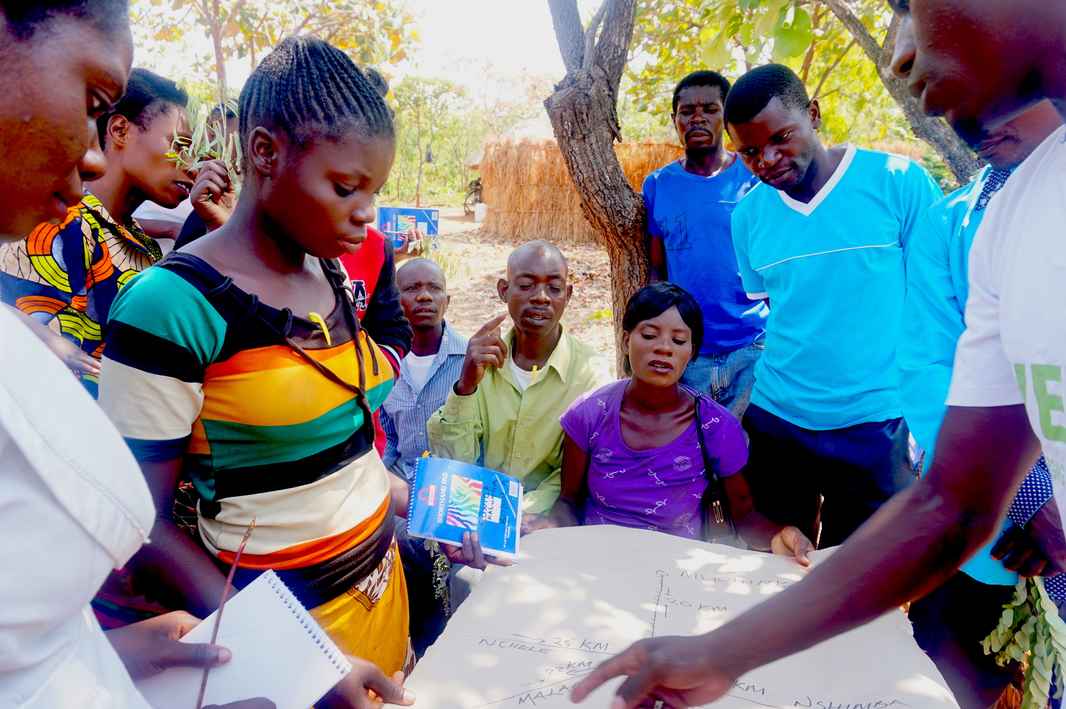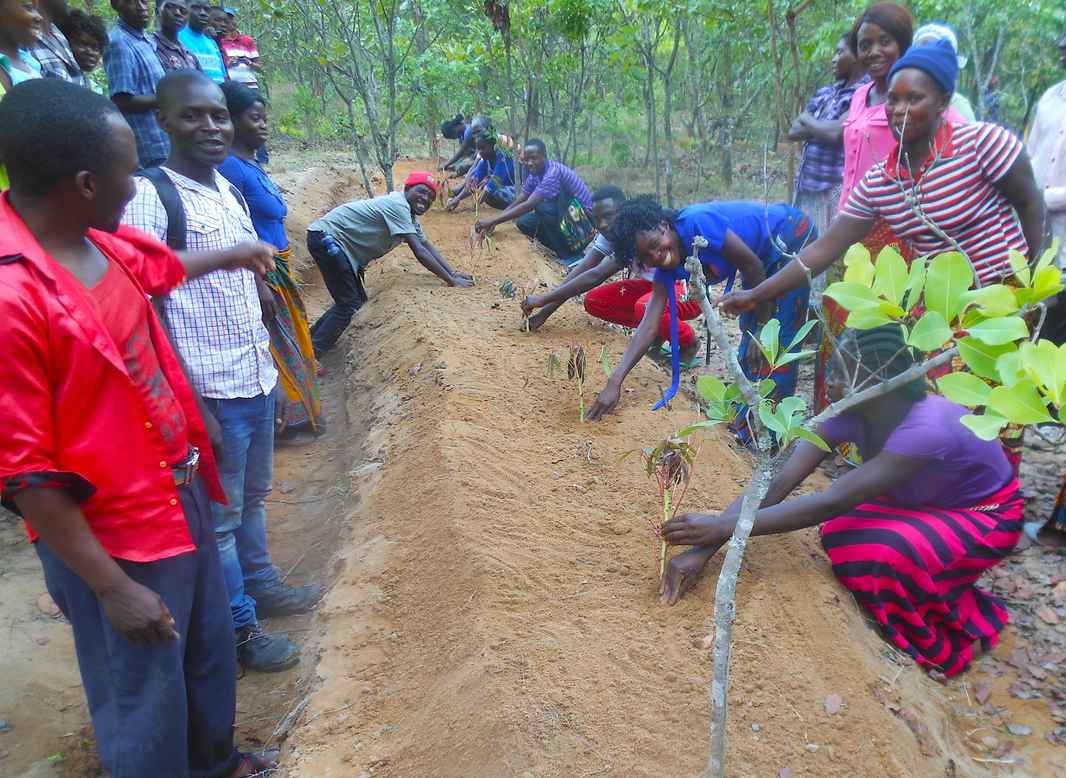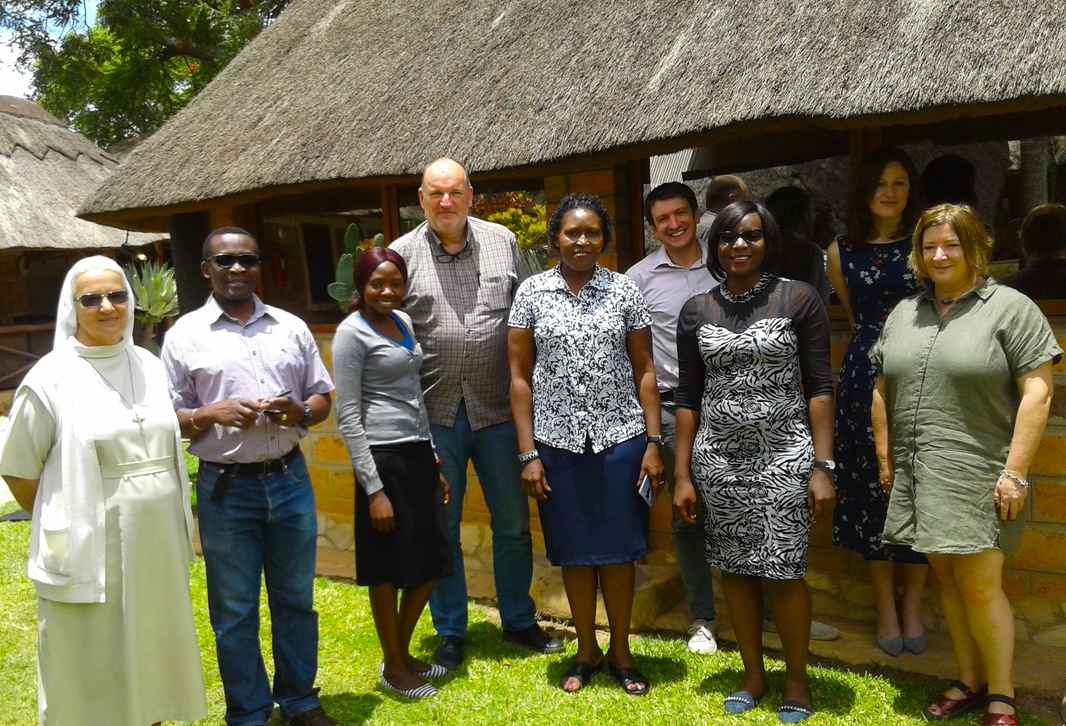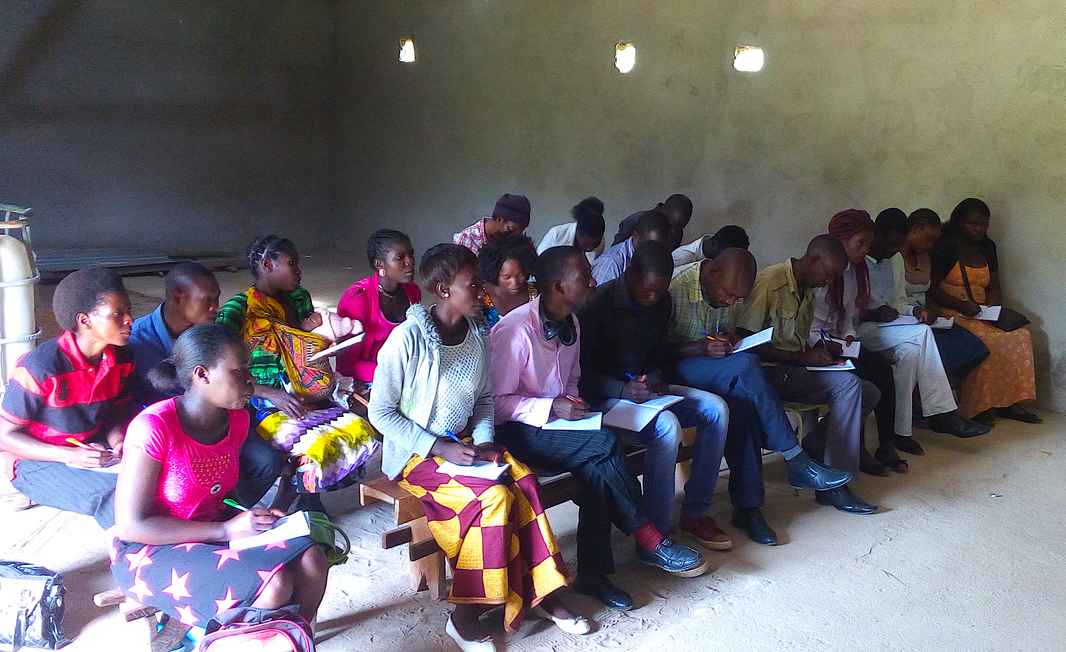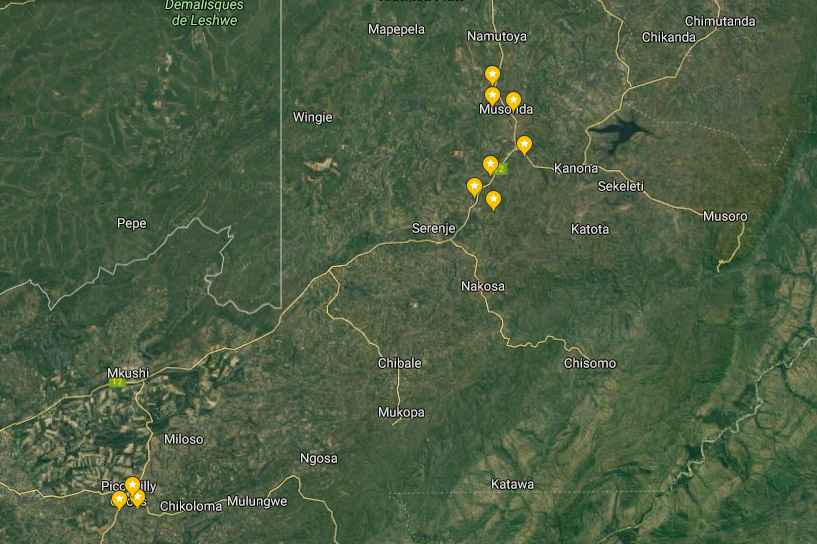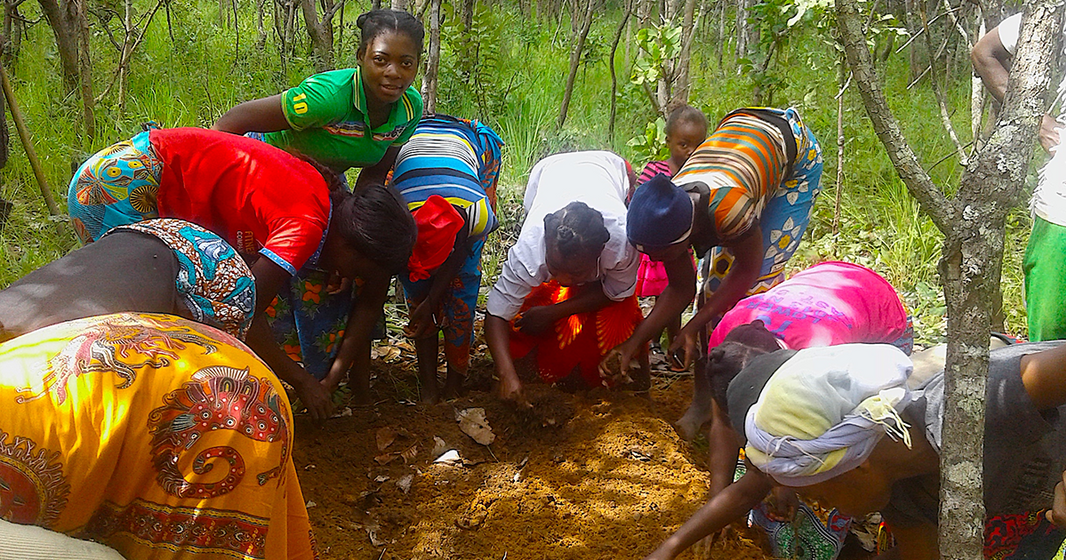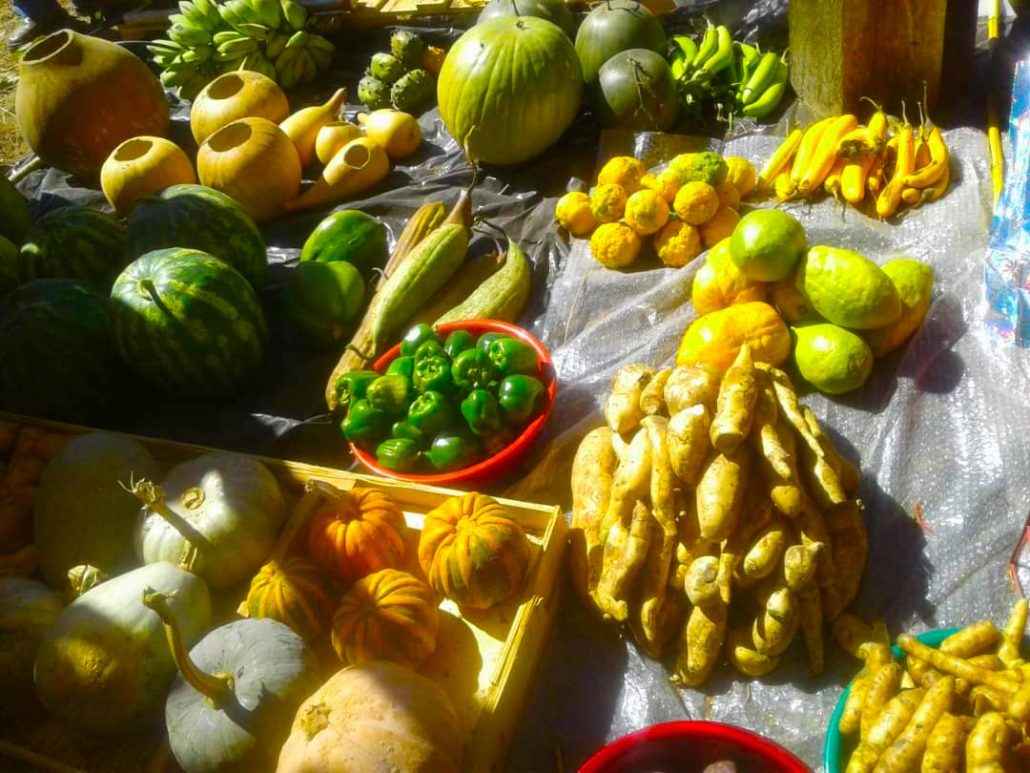ZYCALA!
Project Milestones - Year 1
Building Community Future Scenarios Training (Oct 2017)
ZYCALA’s launch involved approximately 200 local youth leaders across the districts of Chitambo, Serenje and Mkushi. They were offered development support to identify the potential within the dynamic and complex community environment where they live, learn and work. Rural youth, particularly young women, explored, through a series of participatory processes, issues as diverse as scenario planning, collaborative communication, democratic decision making and circular leadership development.
After the creation of smaller learning communities in geographic proximity, a series of mapping exercises supported the identification of:
-
what they currently grow
-
what they currently eat
-
what they would like to eat, that they can grow
-
what they could grow, that has a market
This generated crop growing plans for the first rainy season of the project in accordance with the bio-cultural uniqueness of each community.
ZYCALA youth, during the first activity of the project, recognised the immense power for social change that lies in building community and joined circles of dialogue where all voices were heard, diverse perspectives were welcomed and the future they want to create was articulated.
Conservation Agricultural Training (Nov-Dec 2017)
Twelve regenerative agriculture demonstration plots were established during the Conservation Agriculture Training one (one demo plot in each district direction – north, south, east and west).
Conducted by Gaia Education Chief Trainer, Pradyut Nayek from West Bengal, the training addressed low crop production and productivity exacerbated by soil degradation, high agricultural input prices and poor farming practices.
The youth learnt by practising three principles of Conservation Agriculture:
-
Minimum soil disturbance – to overcome the problem of soil erosion, maintaining soil structure and texture, and conserving microorganisms which are responsible for organic decomposition in the soil.
-
Permanent soil cover with crop residue and live mulch – to control soil erosion and moisture stress, suppress weeds and conserve soil microorganisms which are important for organic decomposition.
-
Crop diversification – to recycle nutrients back into the soil and break the disease and pest life cycle.
Technical Meeting with the Scottish Government (Jan 2018)
Keith Hempshall from WWF Zambia and Memory Makwasa, ZYCALA Project Officer, attended Scottish Government International Development technical meeting in Kabwe. Led by Judith Ballantine and Joanna Keating representatives of SCIAF, Christian Aid and Gaia Education met to offer project updates and discuss future reporting matters.
Bee-keeping Training (Jan 2018)
In January 2018, 21 ZYCALA youth, of which 57% were female, took part in a bee-keeping training. Developing the capacity to ethically produce honey was scheduled early in the project as a way to generate income and long-term livelihood security for youth from Chitambo, Serenje and Mkushi districts.
Learning objectives
-
To introduce the practice of bee-keeping to ZYCALA youth
-
To equip ZYCALA youth with basic knowledge in bee-keeping, management, honey harvesting and processing and for them to act as front runners in their individual districts
-
To teach the youths acceptable and ethical methods of bee-keeping to create a productive honey enterprise
The training was conducted by bee-keeping expert Mr Chansa Chansa, who took participants through the various stages of honey production in four days.
The training began with an explanation of bee-keeping as an important enterprise for both sustainable livelihoods and agricultural conservation. The young people discussed the symbiotic relationship between plants and insects, and the importance of trees and plants as providers of pollen and nectar for bees. They recognised honey bees as drivers of regenerative agriculture in their role as cross pollinators and identified types of trees which can support bee-keeping with their respective flowering seasons.
Participants then looked at different types of hives and the singular role of bees within a colony. Practical demonstrations were given on prudent methods of honey harvesting and how to turn the honey into different products such as wax and honey. Furthermore, participants identified water and the proximity of human settlement as elements conducive to providing resilient environments for bees.
To ensure bee-keeping continues to thrive and expand, participants will be given start-up hives and carpentry training. They can then start making their own hives and use the initial hives as demonstration colonies.
Through the bee-keeping enterprise, it is expected that ZYCALA youth will be able to produce sufficient honey for local and international markets, creating self-sustaining revenue and livelihoods for many more families and communities.
Conservation Agriculture Demonstration Plots (Feb 2018)
The coordinates of all the demonstration sites of the ZYCALA project have been plotted as part of a mapping exercise to identify where in Zambia Scottish Government funded projects are operating.
Altogether, there are ten demonstration sites which act as a base for regenerative agriculture community learning within their respective regions.
The information will be collated by the Geographical Information Services team within the Scottish Government and collated in a map with other funded projects. This will serve as a useful tool for external stakeholders to see the spread of partnership work in Zambia.
Map datum: ARC 1954
Position format: UTM UPS
Coordinates in DMS: Degrees, Minutes and Seconds
Chitambo District
Chimbwi: 1255’ 04.8’’S / 3023’38.0’’E
Yorumm: 1251’43.1’’S / 3023’39.2’’E
Munchinka: 1255’58.6’’S / 3027’15.8’’E
Serenje District
Chankalamu: 1302’58.7’’S / 3029’05.5’’E
Kafunda: 1306’13.2’’S / 3023’24.0’’E
Chilembe: 1309’48.2’’S / 3020’45.2’’E
Mutema: 1311’55.9’’S / 3023’46.2’’E
Mkushi District
Masense: 1359’53.8’’S / 2924’42.3’’E
Masansa: 1357’57.9’’S / 2923’54.5’’E
Makolongo: 1400’16.3’’S / 2921’43.6’’E
Agro-Forestry Training (March 2018)
Agroforestry is a land use management system in which trees or shrubs are grown around or among crops. It combines shrubs and trees with crops to create more diverse, productive, profitable, healthy, ecologically sound, and sustainable land-use systems.
Main objectives of the agro-forestry training conducted in the three districts of Central Province: Serenje, Mkushi, Chitambo.
-
To introduce agro-forestry concepts and management approaches to ZYCALA youth
-
To equip ZYCALA youth with basic knowledge, hands-on experience of agro-forestry in their demonstration sites
-
To relate the importance of agro-forestry and livelihoods
The project will be introducing agro-forestry practices in the demonstration sites.
These activities shall:
-
increase availability of firewood
-
control soil erosion
-
increase soil fertility
-
diversify production for markets and home consumption
-
promote techniques of organic farming and reduce utilisation of inputs by organic manure and legumes
-
increase farmers’ income
-
maintain cultural identity
-
conserve the biodiversity of utilised plants.
You can read the full report here.
ZYCALA Youth Outreach at Agricultural Show in Masansa (May 2018)
Agricultural shows, which exhibit the animals, equipment, and the sport and recreational activities associated with agriculture and animal husbandry, are an important part of cultural life in small country towns, and a popular event in the larger towns and cities of Zambia.
The Lweo Agriculture Block Show, organised by the Ministry of Agriculture and Livestock through the Agriculture Extension Officer under the theme ‘Sustainable Economic Empowerment’, took place in June 2018 in Masansa, Mkushi District.
26 ZYCALA youths from the four demo plots in Mkushi came together to showcase their produce at the ZYCALA youth stand, one of only two stands disseminating information about organic agriculture at the show. The youths presented some of their harvest from the fields and gave brochures to every person that passed through their stand.
Chief Shaibila of the Lala people was so impressed by seeing the youths so fully involved in conserving nature through sustainable organic agriculture that the youths were invited to the chief’s palace for him to hear more about the project.
About 2000 people were told about ZYCALA during the show. Flyers were given to people in Serenje and Mkushi police stations, Ndabala Road block, Masansa turn-off road block, two filling stations, market places, to people selling charcoal and other crops by the road side and to teachers from Chimupati School in Serenje. The teachers from Chimupati School then invited Serenje District Coordinator to teach pupils about conservation.
It was good to see empowered youths engaging others in the work of ZYCALA.


